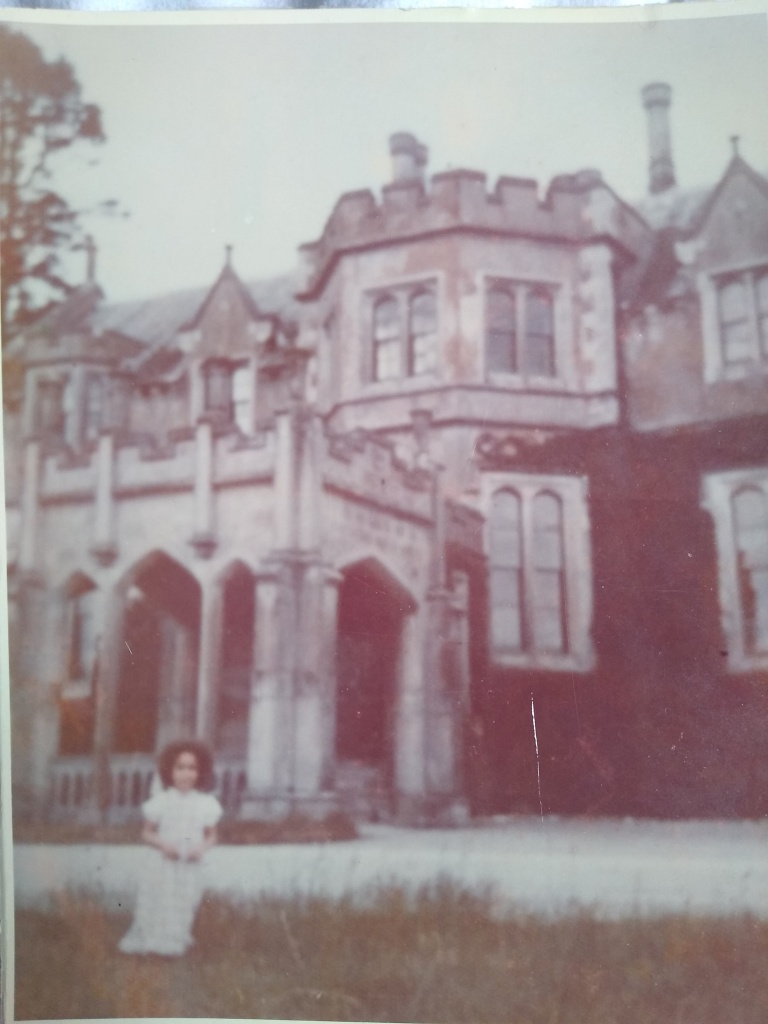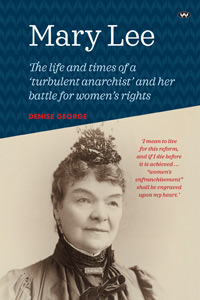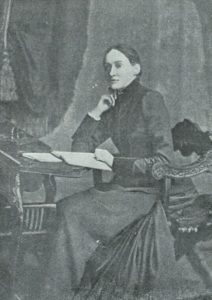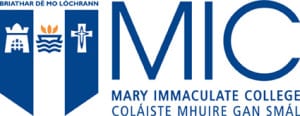Roots of the Present: Memories of My Grandmother Mary Manning
By Lucien Senna

I remember it vividly, as though it was this past summer. I was only seven years old and it was one of three joyous summers I spent in a house rented by my grandmother Molly Manning. It was a pink Georgian house in Sandycove, overlooking the sea, where my mother, sister, brother and me stayed to be near my grandmother’s house on Herbert Road. Only one particular summer’s day stands out as disturbing. I still have a faded colour photo of it. I am standing in a light pink dress with ruffled short sleeves. My hair is a wild crown of frizzy brown curls and I’m posed hesitantly in front of an imposing grey “castle.” The year was 1976. The “castle” was Glendalough House. It was early August. An avid reader of fairytales, I was eagerly looking forward to this day. Upon arrival, my grandmother’s brother-in-law, “Uncle Bobby” Childers, who married her late sister Christobel, urged me to explore the grounds of his house while the adults sat down to talk. I was living a bygone dream.
Read MoreBetween Two Worlds: Examining “Merry England” as an Outlet for Irish Women Writers
Mary McCartney, University of St. Thomas

In 1885, Katharine Tynan sent a letter to Alice Meynell thanking her for reviewing Tynan’s book Louise de la Vallière and Other Poems in the monthly periodical Merry England (1883–1895). Tynan writes, “It is a beautiful review, and I am glad to have been reviewed by you. […] I value your belief that I am a poet as much” (qtd. in Atkinson 29). Tynan was an Irish nationalist writer who had close ties to W. B. Yeats and was involved in the early years of the Irish Literary Revival. Meynell was a British writer, publisher, and suffragist who co-founded Merry England with her husband Wilfrid in 1883. Most existing scholarship about Merry England is dedicated to the periodical’s contributions to the Catholic Literary Revival, such as Elizabeth Gray’s article “Catholicism and Ideal Womanhood in Fin-de-Siècle Women’s Poetry.” To date, the periodical’s function as a platform for Irish women writers has been largely overlooked. Yet Merry England played an important role in the careers of Irish women writers working in London or submitting work to London publications.
Read MoreIrish Women Writers and the Argosy (1865-1901)
Tove Lilith Conway, University of St. Thomas

The title of the Argosy (1865-1901) conjured up the idea of a ship filled with rich cargo. Indeed, each monthly issue of the magazine offered tales of travel and adventure, along with a steady supply of fiction, poetry, and nonfiction prose. The magazine was initially produced by Alexander Strahan and edited by Isa Craig; however, after the controversial serialization of Charles Reade’s sensation novel Griffith Gaunt (1866), Strahan sold the magazine to London-based novelist Ellen Wood (Ehnes 154). Within three years of her takeover, the magazine’s monthly circulation rose to 20,000. Alvar Ellegård describes the Argosy as “appealing primarily to a genteel, middle-class, lady public, of low to fair educational standard” (17). Yet under Wood’s editorship (1867-87), the magazine addressed complex themes, destabilized gender roles, and upset boundaries between high and low culture (Phegley 187). It also turned readers’ attention to cultures and locales outside the metropolis. It often featured content focused on Irish culture. For example, the Argosy published numerous short stories that ranged in topic from Irish rural landscapes to the Irish peasantry. Irishness was an integral part of the magazine’s identity, themes, writers, and readership.
Read MoreResearch Pioneers 3: James H. Murphy
From the period of his earliest publications, James H. Murphy has been involved in the process of recovering and re-examining largely forgotten Irish works. As one reviewer noted of his Catholic Fiction and Social Reality in Ireland, 1873-1922 (1997), Murphy’s work is consistently the ‘product of considerable and careful research’ into ‘texts many of us never heard of’. Likewise, as another reviewer asserted about his 2011 Irish Novelists and the Victorian Age, Murphy’s intensive research into and surveys of novels by the ‘many forgotten authors’ of that era have been key to the invigoration of research into Irish women’s literary texts. We ask Murphy to reflect on his influential research and recovery efforts here.
Read MoreLetters and the archive: Kate O Brien and Mary O Malley
Dr. Barry Houlihan
The correspondence of writers offers a significant insight into their personal as well as professional lives, revealing much about the networks in which they communicate and circulate ideas. Such archival sources can counter other public and more official sources and narratives including reviews, production histories, publication and publishers’ records, which all give voice to the public reception of a writer, though of course always within the context through which those works were received, distributed, or in some cases also censored and banned. Like other women novelists, playwrights, and writers of her generation, Kate O’Brien was a frequent target of such moral and literary censorship within modern Ireland.
A series of letters between Kate O’Brien and Mary O’Malley, founding director of the Lyric Theatre in Belfast, reveals a neglected exchange that may not be widely known among scholars or fans of O’Brien’s work. Held within the Lyric Theatre/O’Malley Archive at the Hardiman library, NUI Galway, the letters between O’Brien and O’Malley record an exchange over many years between two pioneers in literary form, theatrical production and publishing.
Read MoreBook Review: Mary Lee: The Life and Times of a ‘Turbulent Anarchist’ and Her Battle for Women’s Rights
Sharon Crozier-De Rosa
Mary Lee: The Life and Times of a ‘Turbulent Anarchist’ and Her Battle for Women’s Rights by Denise George (South Australia: Wakefield Press, 2018 270pp. $34.95) ISBN: 9781743055960 in Lilith: A Feminist History Journal, Number 25, 2019, pp.109-110.

As a female who similarly migrated from Armagh to Adelaide, and who came to be interested in woman suffrage – researching and writing about it rather than having to actively campaign for it, thankfully – I have always been intrigued by the figure and life of Mary Lee. With this book, Denise George uses her considerable skills to flesh out the life of this little-known activist. What results is a beautifully written, interconnecting biography of Mary Lee with a history of South Australia and its woman suffrage movement.
Read MoreResearch Pioneers 2: Heather Ingman and Clíona Ó Gallchoir
2018 saw the landmark publication of Heather Ingman and Clíona Ó Gallchoir’s A History of Modern Irish Women’s Literature. Featuring 22 chapters that address women’s writing from the early modern period to the present, the volume makes a rich intervention not only in Irish Studies but in women’s literary history. The volume, the editors note, ‘complicates and enriches our understanding of the Irish canon by retrieving forgotten writers, placing well-known authors in new contexts and allowing readers to trace patterns and developments in women’s writing across periods and languages.’ (Irish Times) We are delighted that Ó Gallchoir and Ingman agreed to answer a few questions about the project.
Read MoreIASIL 2019 – ‘The Critical Ground’ and Women’s Literary History
Anna Pilz

Over the course of a week in late July 2019, close to 300 scholars gathered at Trinity College Dublin to celebrate the 50th anniversary of the ‘International Association for the Study of Irish Literatures’. Under the theme of ‘Critical Ground’, delegates and participants reflected on the developments of Irish literary studies over the past fifty years, discussed the latest developments in the field and sketched out ambitions and new directions for the future.
Read MoreResearch Pioneers 1: John Wilson Foster
Research Pioneers in Irish Women’s Writing: An Interview Series
Introduction
Since the 1990s, scholarship on Irish women’s writing has made some significant strides in recovering forgotten authors and texts. Thanks to pioneering work by researchers such as John Wilson Foster, Patricia Coughlan, Heidi Hansson, Margaret Kelleher and James H. Murphy, we have begun to see developments that conceptualise and offer new frameworks for researching and understanding Irish women’s writing of the period between 1880 and 1920.
Read MoreMINING THE WORKS OF IRISH WOMEN WRITERS, PART II
Kathleen Williams
- See Mining the works of Irish Women Writers Part 1 here.
In 2005, granted a two-month research leave from the Boston College Libraries, I worked on a project that sought to raise visibility of Irish women writers. The project included creating an online research guide that features bibliographies, anthologies, biographies, online resources and more, identifying the many women writers who worked in the nineteenth and early twentieth century.
Read More


